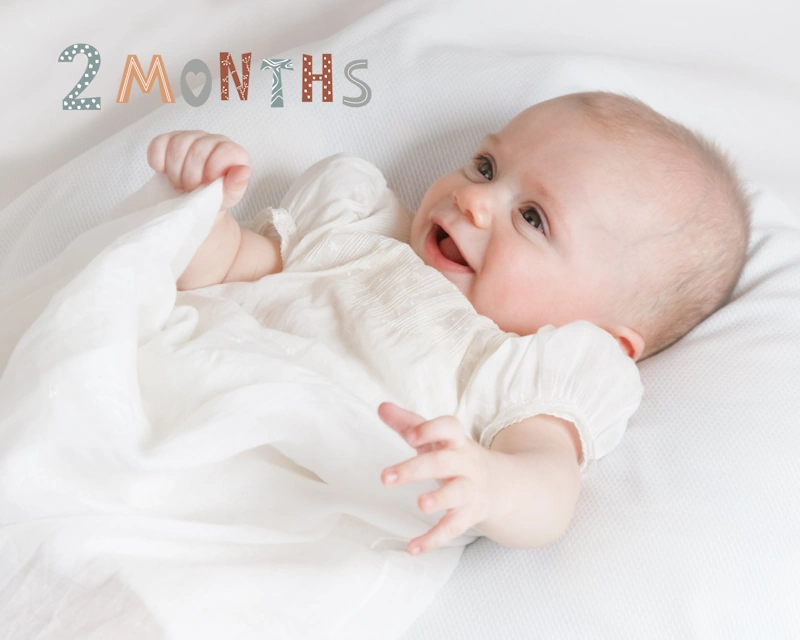The first year of a baby’s life is a period of rapid growth and development, marked by a series of milestones that showcase the remarkable progress of a tiny human being. These big and small milestones are crucial indicators of a baby’s physical, cognitive, and emotional development, including 2 month baby milestones.

Among these, 2 month baby milestones are particularly significant. At around 2 months, babies will typically reach remarkable developmental milestones. Please remember that every child develops at their own pace, so there could be variations.
Social Interaction
Your baby will start to show more interest in faces and often smile and make sounds in response to your face or voice. This is the beginning of their social development.
One of the most heartwarming 2 months baby milestones is when a baby starts responding to social interactions with genuine smiles. This milestone is a delightful moment for parents and a sign of emerging social and emotional awareness in the baby.
Visual Tracking
Two-month-olds will begin to track moving objects with their eyes and try to follow them from side to side. This indicates eye coordination and visual development. Babies’ vision continues to improve in 2 month baby milestones. Babies at this time can often follow objects or faces with their eyes as they move across their field of vision. This is an early sign of visual development and cognitive progress.
Head Control
During tummy time and when held upright, your baby may start to lift and hold their head up for short periods. Their neck muscles are strengthening, an essential step toward better head control.
During the first month, babies often have limited head control. However, they exhibit more significant control over their neck muscles by the second month. This is an essential milestone, as it marks the early stages of developing motor skills necessary for activities like rolling over and sitting up in the future.
Hand Movements
Your baby’s hands will become more active, and they may bat at objects or bring their hands to their mouth. This is the beginning of hand-eye coordination and self-discovery.
Growth
Most babies will have gained weight and length since birth, demonstrating healthy growth. Regular check-ups with your pediatrician will help monitor their growth and development.
Sleep Patterns
At around two months, your baby may begin to establish a more predictable sleep pattern, with more extended periods of nighttime sleep and shorter naps during the day.
Although sleep patterns vary widely among babies, some infants establish more predictable sleep routines during the second month. This can relieve exhausted parents and is a positive sign of the baby’s evolving sleep-wake cycle.
Feeding
Babies may start to show better coordination during feeding, with more efficient sucking and swallowing. This can lead to slightly longer feeding sessions.
In the first month, newborns typically feed every 2 to 3 hours, but their feeding patterns begin to evolve by the second month. Babies often display a more predictable routine, with longer intervals between daily feedings and sometimes longer stretches of sleep at night. This change reflects the baby’s growing capacity for milk consumption and their developing ability to sleep for extended periods.
A baby’s sucking reflex becomes more refined during 2 months baby milestones. This means they can latch onto the breast or bottle more effectively, producing more efficient and productive feedings. Improved sucking coordination also reduces the likelihood of nipple confusion, making breastfeeding and bottle-feeding more manageable for both the baby and the mother/caregiver.
Second-month babies tend to have more extended feeding sessions than their first few weeks. This is partly due to their increased milk intake and their heightened alertness and curiosity about their surroundings. Longer feedings provide essential nutrients and calories needed for growth and development.
Cooing and making sounds
While still in the early stages, some babies may begin to make cooing sounds as their vocal cords and communication skills develop.
While cooing and gurgling sounds may have started in the first month, babies tend to become more vocal as part of 2 months baby milestones. They begin experimenting with a broader range of sounds in response to their parents’ voices.
Babies start cooing between 6 to 8 weeks, marking a significant milestone in a baby’s development. These soft, melodic sounds, often resembling vowel-like noises like ooo or eee, are an enchanting symphony of vocal exploration. Cooing is an early form of communication, and it’s one of the first ways your baby interacts with the world around them.
At this stage, babies are starting to discover their vocal cords and are enchanted by the sounds they can produce. Parents will notice their baby responding to visual and auditory stimuli by cooing. While cooing doesn’t have any specific meaning yet, it’s an essential step in developing language and communication skills. It signifies that your baby is becoming aware of and experimenting with their voice.
Why Do Second-Month Milestones Matter?

Early Detection of Developmental Delays
Monitoring 2 months baby milestones helps parents and healthcare professionals detect potential developmental delays early on. Early intervention can be crucial in addressing any concerns and ensuring that a child receives the necessary support to reach their full potential.
Parent-Child Bonding
Achieving 2 months baby milestones, such as social smiles and increased vocalizations, fosters a deeper bond between parents and their babies. These interactions are rewarding and contribute to a child’s emotional development.
Developmental Progression
2 months baby milestones are building blocks for future development. For example, improved head control sets the stage for the baby’s ability to explore and interact with their environment.
Peace of Mind
Knowing what to expect regarding milestones can provide parents with a sense of reassurance and reduce anxiety. It helps parents understand that their baby’s development is progressing as it should, even when there are variations in the timeline.
Key Takeaways
2 months baby milestones are significant development indicators, marking essential steps toward growth and learning. These milestones encompass social, physical, and cognitive domains, reflecting a baby’s evolving abilities and emerging personality.
By recognizing and celebrating these 2 months baby milestones, parents can bond with their children and ensure that they are on track for healthy development.
Remember that every baby is unique, and development can vary from one child to another. Please consult with your pediatrician to ensure that your baby is progressing at a healthy pace and guidance to support their specific needs and milestones.
Are you a caring parent looking for comprehensive pediatric care for your little one? Access Pediatrics provides quality pediatric services for your baby’s well-being.
Ensure your baby’s growth, development, and overall health are on track with Access Pediatrics. Call us today if you need a Bolingbrook Pediatrician or a Berwyn Pediatrician.
